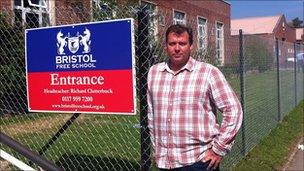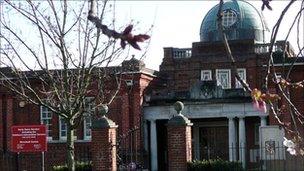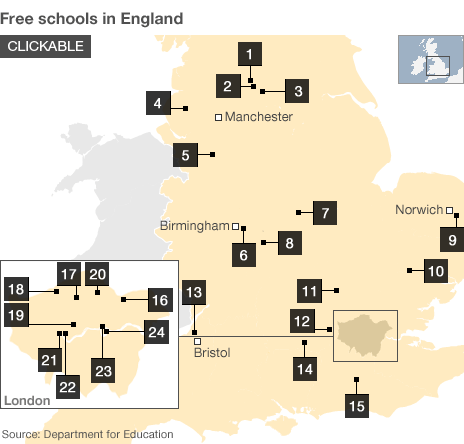Free schools: How they were set up
- Published
.jpg)
Penny Roberts will be chair of governors at the school she set up
Twenty-four new free schools have sprung up in England in the 15 months since the coalition came to power - driven by individuals and groups inspired by the government's invitation to set up their own schools.
Faith groups, academy chains, parents and teachers are among those who are now seeing their bids become a reality, alongside private schools transferring to the state sector.
More than half will be open by the end of the week, the rest by the end of the month.
Most have been - or still are - the scene of frantic preparation, with whole new teams of teachers arriving with the decorators, as well as the carpets, books and interactive whiteboards.
Free schools were a centrepiece of the Conservatives' election manifesto - the idea of local people setting up schools fitting in with its Big Society agenda.
They might be relatively small in number - 24 out of England's 20,000 schools - but the government wants more of them and says that number should "at least double" next year.
Very similar to academy schools, they also reflect the way the government wants to revolutionise the system, with schools funded directly by Westminster, semi-independent and outside of local authority control, with the freedom to vary the school day, terms, the curriculum and teachers' pay and conditions.
It is a vision which worries teaching unions and other critics of the policy - who say free schools will take money and pupils from existing schools, increase segregation and division and lead to the break-up of the state school system.
An 80-hour week
But what is it like to be the people at the cutting edge of the policy - those setting up the schools - and those who oppose them?
Penny Roberts is the driving force behind St Luke's Church of England Primary in Camden, London, which will open to a class of just 15 pupils in a renovated church hall next week.
The school will take children of all faiths and none, giving places to those who live nearest to it, but will have a Christian ethos, she says.
"The vision is for a local school with a close, community ethos to meet local needs," she says.
The mother of two - who practised as an educational psychologist until having her children - thinks she has spent as much as 80 hours a week getting the school off the ground.
"It has all been happening very quickly and I have loved it," she said.
"There is always a decision to be made and you see the results so quickly."
There have been complaints from home though.
"I have not seen the children much this year and my daughters flip between being proud and excited and annoyed by it all," she said.
She says the school has not faced direct local opposition, although some people there might be against the idea of free schools.
At this school as with others, the idea was a parent's - but the backing of another group - in this case the Church of England - was crucial.
"There's a severe shortage of places in Camden, especially in this part of the borough," Penny Roberts explains.
"I saw the policy and the need and first went to the church with the idea of setting up a school here and they were supportive. They have always been very outward-looking. I got a group of parents together and that led to the community getting behind it."
The parents gathered support and signatures for a petition through local parents' networks and mother and toddler groups.
With the Church of England behind her - and a site - things moved very fast. The church teamed her up with "a fabulous project manager", she says.
"It was incredibly quick. The information came after Easter and the forms in early July," she says.
Academy groups
Other parents wanting to set up free schools have turned to groups behind existing academy chains to help make their dreams a reality.
This is what happened in Bristol, where parents made the case for a school in the north-west of the city after setting up a group called Parents' Voice.
Among the parents were Blair King and his wife. and he is now the chairman of the new Bristol Free School's governing body.

The Bristol Free School grew out of a campaign by parents
The school opens today in its temporary home - a building which used to house the government's Environment Agency. Its permanent home is due to be a former private school.
"I am excited but nervous as well," said Mr King.
"We have had a plan up until now and now we have a school and we have a legal and a moral responsibility to the children and the parents who have put their faith in us.
"It is an enormously privileged position to be in and it is the culmination of two years' work."
Mr King, a self-employed management accountant, described how the school came about.
"My wife and her friend were on a night out and got talking to a prospective MP, Charlotte Leslie [now a Bristol MP] and asked her what she was going to do about secondary schools.
"That led to a meeting in Charlotte's house in September 2009 and the setting up of Parents' Voice.
"She helped us organise ourselves. We did leaflets and collected signatures for a petition and there was a lot of interest and support for a local secondary school."
There was a need for a school for that area of Bristol, Mr King said: "From five local outstanding primary schools, kids are going to 30 different secondaries in and out of Bristol, including independent schools.
"We wanted a local school where kids could stay together and learn together."
He estimates he has spent about 20 hours a week on the project.
'Political game'
The free school has faced strong local opposition - especially from other local secondary school head teachers - who fear it will take money and pupils from their schools and lead to more segregation in the community.
Clare Bradford, head teacher of Henbury School, said: "There is strong evidence that this will have a negative impact on local schools.
"In the four schools local to the Bristol Free School there are more than 300 spare places just in Year 7 [the first year of secondary school], largely due to a bid drop in the demographic.
"How can it be right to spend tax-payers' money on extra provision when all the schools have vastly rising results and value added scores?
"Schools are not businesses. If they fail it is the children who will suffer and the children whose schools will lose teachers and some of their option choices. They are playing a political game with it."
Parents will not be involved in the day-to-day running of Bristol Free School, although they are part of the non-profit-making trust that has been set up to run it.
The trust was set up with "school improvement providers" Education London, which has worked with academy schools and is advising other free school bidders.
About six of the new free schools are being run by groups already operating academy chains and for the leaders of these new schools, it has also been a momentous journey.
The Ark Conway Primary Academy, in London's Hammersmith, is being set up by the Ark education charity in a former library - a Grade II listed building - and is one such school.
It opens next week and as the painters finished and the equipment came in, head teacher Damian McBeath was holding staff training days and visiting each of his 30 new pupils in their homes to find out their interests.

Ark Conway Primary Academy is opening in a former library
"This week has been incredible," he said.
"I have never been involved in the process of opening a new school before. There were times this summer when I thought 'This is never going to happen'... to see the transformation of the library, the carpets laid and the decoration up - it's amazing."
There had been some touching moments, he said, when he visited the new pupils and their parents.
"It was moving to see their [the parents'] excitement at being at the start of something new," he said.
As for the four-year-olds facing their first day at school, there was a similar if simpler emotion.
"The children see it as an exciting new step - their big school," said Mr McBeath.
